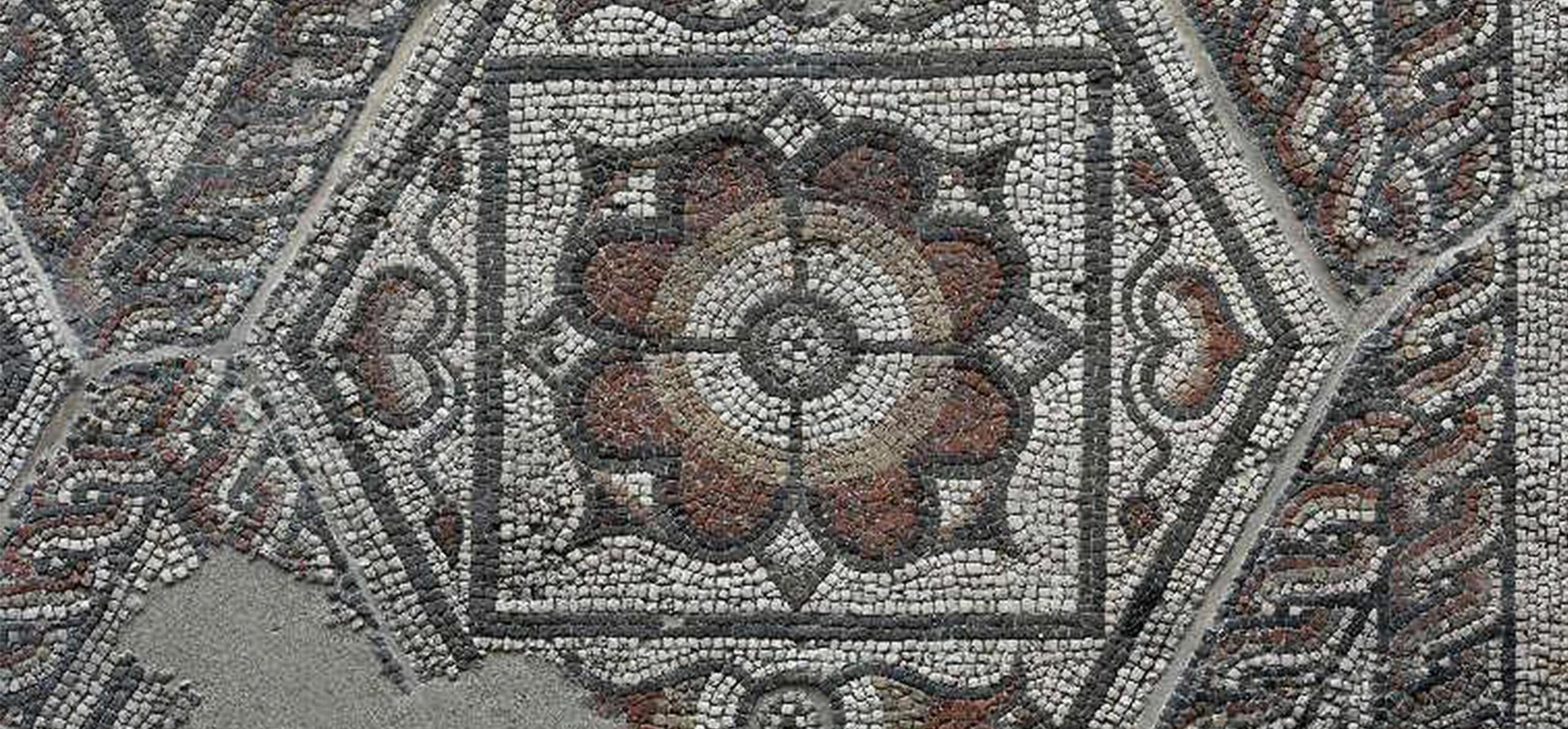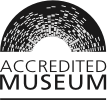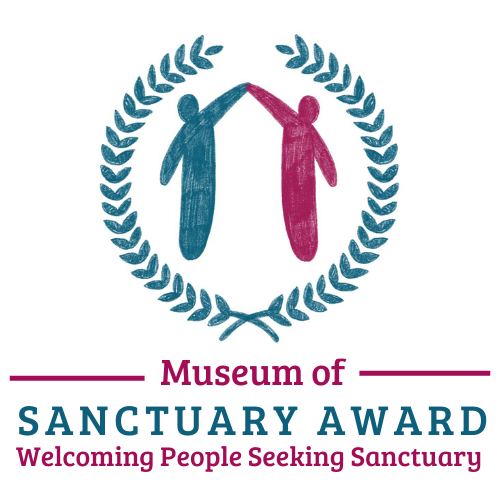As part of our Roman Fun Day in 2019, a character from Calleva Atrebatum, the Roman town at Silchester, took up residence in Reading Museum's Art Gallery. There, they give visitors a glimpse into his family’s life in Roman times.
As part of our range of Roman resources and activities this February half term, we are giving you another opportunity to step back in time all those thousands of years to meet Marucs and Aurelia, a Roman husband and wife, and find out all about their everyday life in Calleva Atrebatum.
Meet Marcus

Meet Marcus, joining us today all the way from Roman Britain in the 1st century AD
Salve! My name is Marcus Avidius Marcellus. You are most welcome to my home in Calleva, which I believe in the time you come from is now called Silchester.
I have lived in Britain, or Provincia Britannia, which means the Province of Britain, for many years. It is just one of the many provinces of the mighty Roman Empire.
I first came to this land, like many people did, as a soldier, a Roman Legionary. The life of a Legionary is extremely hard, and I was once part of Legion VI, stationed for a time at the lonely outpost of Coggabata at Hadrian’s Wall.
My life changed unexpectedly when after saving my commanding officer in a nasty skirmish with the Picts, he rewarded me with the chance to retire with a substantial amount of money to live a peaceful life in another part of the province. I chose to come to Calleva Atrebatum, and it is here that I met my wife Aurelia.
One of the reasons we Romans came to Britannia is its rich and fertile land. The land that surrounds Calleva is full of good fields, pasture and woodland. I have a modest amount of farmland, where we are able to grow food both for ourselves and to sell in the town to make a living.
We have a good-sized house in the town, built with strong flint walls and a sturdy stone slate roof. Inside, it is brightly painted, and over time we have been able to have beautiful mosaics made to cover the floors of some of our more important rooms. We have slaves to help with the work of our farmland and the running of our home. We try to treat our slaves fairly, and we have agreed that when we die, our slaves will be set free.
One of the first tasks a slave performs is to light the fires in the house, especially those for the furnaces used by our home’s hypocaust, our under floor heating. The winters here in Britannia can be very cold, as you might be finding recently, and so it is important to keep our house as warm as possible. To do this, we raise our floors on stone pillars. Hot air from the furnace flows under the floor and heats it, which in turn heats the whole room.

Stack of tiles mortared together, used in under floor heating. Museum object number REDMG : 1995.85.415
Our slaves will help us to dress, which can be particularly important for our daughters Helvia and Flavia and our son Cornelius. Both males and females wear simple tunicas, tunics, made of either linen or wool. For the females, it is the longer tunica called a stola, which reaches down to their ankles, that they may need a little more help with, whereas the males might have a toga for special occasions which can be up to three times the length of the person who wears it!
Although my son needs a slave to help him with his toga, I try to encourage him to learn to put it on by himself, as you cannot have a slave follow you around all day in case it needs adjusting, especially if you are out in public maybe listening to or even making a speech at the Forum. Imagine the embarrassment!

Head stud brooch, common British type of brooch. Museum object number REDMG : 1995.2.5
The Forum is a large public square in the centre of the town. It is a place of trade, money, important gatherings and meetings. It also houses the Basilica, a place of law where our Duoviri, our Magistrates, govern the town wisely.
When I am not supervising work on my household’s farmlands, I can be found meeting friends at the Forum or maybe at the public baths. Keeping ourselves clean and healthy is of great importance to us Romans. When I visit the baths, I do so in the afternoons with the other men of the town. On entering, I might use the latrines or public toilets, which can actually be a place to have quite a nice long conversation with a friend or two whilst sat there.
When I have finished at the latrines, I clean myself with a sponge, such as the one in the image below. As a polite Roman, I will not go into detail exactly what ‘cleaning myself’ means, but I am sure when you see the sponge, you will be able to work that out for yourself!
After a little exercise in the Palaestra or exercise yard, I leave my clothes and valuables safely with an attendant in the Apodyterium and make my way to the Frigidarium, or cold room, for a quick plunge in an ice-cold bath. This is not for the faint-hearted on a cold winter’s day in Britannia!
Hypocausts heat both the Sudatorium (sweating room) and Caldarium (hot room) where I sweat the dirt from the pores of my skin. A slave will then scrape the dirt off my body with the metal scraper you see in the image below known as a Strigil. This may not sound very comfortable, but should the slave scratch or poke me with the strigil, even by accident, I can order them beaten or even whipped as a punishment. So, as you can imagine, the slaves who work at the public baths develop very steady hands!
Once the dirt has been scraped away, oil and perfume are applied to my body, and then I can choose to have another swift dip in the Frigidarium before finishing my visit by taking a much more leisurely swim in the great bath. This is once again a place where I can relax, talk to friends and spend as long as I wish before finally collecting my clothes and belongings to leave feeling peaceful and healthy. I hope one day to be able to visit the fine baths at Aquae Sulis, or Bath as you would know it, because Calleva lies at an important crossroads on the road that runs between Aquae Sulis and our capital in Britannia: Londinium. Or, as I believe you now know it: London.
A more exciting, but much more bloodthirsty, piece of entertainment can be a visit to the Amphitheatre. Our Amphitheatre in Calleva is at the eastern edge of the town outside of the town walls. Whilst not as spectacular as being part of the crowd of 50,000 at the Colosseum in Rome itself, a crowd of up to 9,000 people can gather to watch gladiators fight either with each another or wild animals. My wife Aurelia is far less keen on gladiatorial combat than I am, and she leads quite a different life from day-to-day in many ways.
I shall leave it to Aurelia to explain more of this to you!
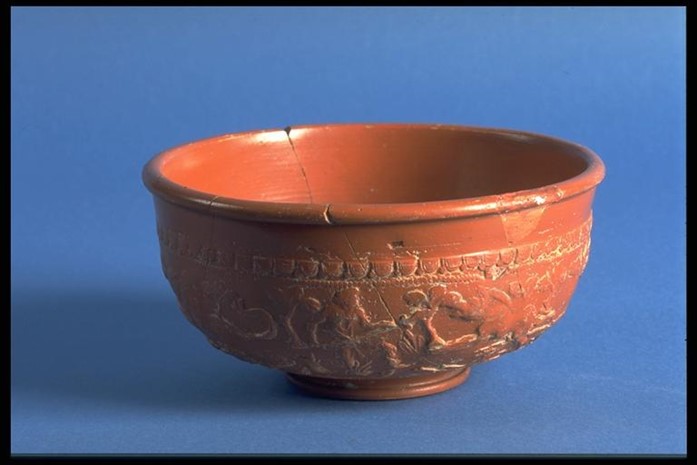
Samian ware bowl decorated with an image of gladiatorial combat. Museum object number REDMG : 1995.81.1778
Meet Aurelia
When the day begins, my first task is to instruct our slaves about their jobs and duties for the day. I am responsible for our home, both its daily running and finances, as well as making sure our children are brought up healthy, happy and are properly schooled, so that they can make their way in life here in Calleva.
For Roman children, it is mainly the boys who go to school from the age of seven, although this is not always the case in a slightly more wealthy family such as ours. Occasionally, I might send our daughters Helvia and Flavia to the same tutor as our son Cornelius or take the time to teach them all I can at home, as my mother once did with me.
Our schooling often takes place in a shop with just a curtain separating the children from the rest of the building, or sometimes they might be taught somewhere within the Forum in the centre of the town. There, children learn how read and write as well as arithmetic, counting on their fingers or using an abacus. When learning how to write, the children begin by scratching their writing into wax tablets with a stylus made of reed or metal and then, later, writing on scrolls using an ink made of soot. Tutors can be very strict and punish lazy pupils with a beating!
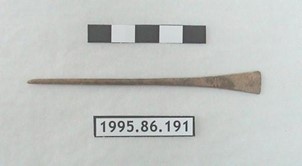
A Roman stylus made of bone. Museum object number REDMG : 1995.86.191
Like Marcus, I too enjoy a visit to Calleva’s public baths, with women going separately to the men in the mornings.
When I have finished bathing, there may be the chance to have an attendant style my hair or try on fine jewellery!
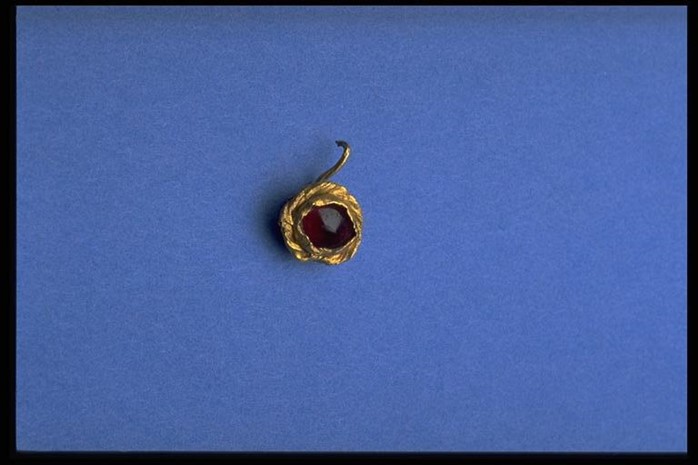
A gold earring with almandine garnet found at the public baths in Silchester. Museum object number REDMG : 1995.2.2
We believe our household is protected by the spirits of our ancestors known as Lares, and it is important to make prayers and offerings at our small shrine to them in the house called the Lararium. I try to make sure there is always an oil lamp burning nearby as a sign of respect to them. In this way, we hope they will bless our home and family so that we might continue to live happy lives.
In the same way, even our pantry and kitchen are protected by the spirits Panes and Penates. They stop food from spoiling and also bless us in producing it in the first place. We keep special small statues of them in a cabinet in the kitchen and these are placed carefully on the table at meal times. We give thanks to them before we eat.
We eat with either spoons or our fingers. Belching when eating is seen as polite because it is a way of telling people how much you are enjoying the food!
We eat bread from the corn grown on our lands alongside vegetables such as peas, beans, carrots and parsnips and many different fruits, meats and fish. There are some more unusual dishes we enjoy such as snails, dormice and a favourite of our family is Songbird Surprise which is a dish of small songbirds (such as quails) served with an asparagus sauce and a quail’s egg.
Another popular ingredient I like to use in cooking is a strong sauce made from fish and salt we call Garum. When preparing food, if any ingredients need grinding down or mixing, a mortarium like the one in the image below is used and a large stone crushes and grinds grain into flour or herbs ready for mixing or adding to a dish.
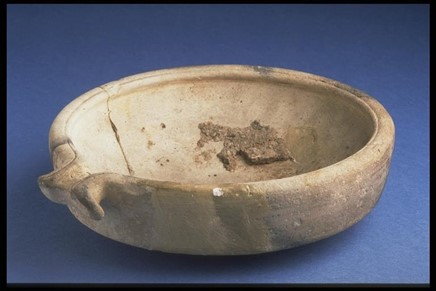
A mortarium found at Silchester. Museum object number REDMG : 1992.1.1611
I will often have slaves to help prepare the food, especially if we have dinner guests. On those occasions, we would try to have our main meal a little earlier, even during the afternoon in the winter, because it can very dangerous to let people walk the streets alone in the evenings. If anyone does leave our house after dark, I always send some of my stronger male slaves with them holding flaming torches to make sure they get safely back to their own homes.
As Marcus has told you, I have little time for the rather bloodthirsty spectacle of the gladiatorial battles, although occasionally my friends might be able to persuade me to go with them. Usually though, my taste is for the much more civilised entertainment of watching a play which I feel is a far better use for Calleva’s Amphitheatre. I enjoy the works of our playwright Plautus, with his tales of kidnapped heiresses, foolish old men and cunning slaves, but always with a happy ending.
Speaking of which, I believe our time together is also at an end.
On behalf of my family, I thank you for allowing us to share a little of our lives with you today.
Valeas!
